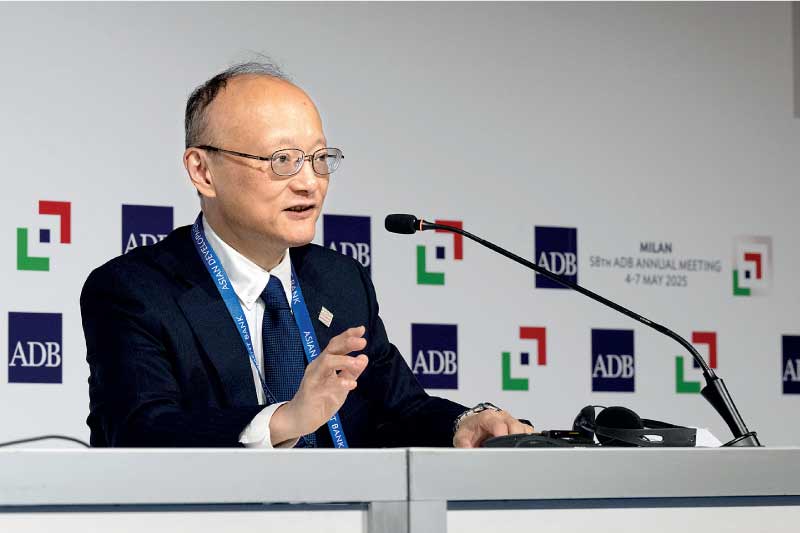Tuesday Feb 17, 2026
Tuesday Feb 17, 2026
Monday, 5 May 2025 05:31 - - {{hitsCtrl.values.hits}}

ADB President Masato Kanda gestures during the media briefing on the inaugural day of the 58th Annual Meeting which began yesterday in Milan, Italy
By Nisthar Cassim in Milan, Italy
Asian Development Bank (ADB) President Masato Kanda yesterday called for continuity of reforms to ensure long-term growth and stability among member countries, most of whom are in the region itself.
“The regional economy is coming from a position of strength, but there is a lot of uncertainty ahead. This means we cannot be complacent,” Kanda said at the opening day press conference of the four-day ADB’s 58th Annual Meeting in Milan, Italy, attended by over 5,000 participants including the Daily FT.
The forum theme of which is “Sharing Experience, Building Tomorrow” is an annual opportunity for 69 member nations – 50 from the Asian region – to share insights on how to solve the region’s complex challenges together.
With the new uncertainties facing developing member countries, ADB Chief Kanda stressed the importance of exploring innovative solutions together.
He also reaffirmed the ADB’s commitment to remain a steadfast partner amidst challenging times.
“As President, I am committed to supporting our members in building resilience against economic shocks, fostering sustainable growth, creating jobs, and improving the lives of the poor and most vulnerable,” said Kanda, who took over as President in February this year.
Stressing that amidst new challenges, reforms must continue to ensure long-term growth and stability, the ADB Chief emphasised that countries must pursue two key strategies. “First is to implement sound economic policies to safeguard stability and sustain investment flows. Second is to enhance regional connectivity to strengthen the region’s collective resilience,” he added
Kanda also urged emerging economies to further develop infrastructure with the private sector, open up economies via liberalisation, and improve competitiveness and human resource development initiatives. He stressed competition fosters innovation.
Transforming food systems
He highlighted another critical issue: transforming food systems in Asia and the Pacific. Across the region, Kanda said food systems are under growing pressure from climate change, environmental degradation, and disruptions to global trade.
“These stresses are driving hunger, worsening malnutrition, and putting livelihoods at risk, especially in rural areas. At the same time, food and agriculture offer enormous potential. The sector employs 40% of Asia and the Pacific’s workforce and occupies half of all habitable land,” he said.
The ADB Chief pointed out that with smart investments and sound policy reforms, Asia can turn today’s vulnerabilities into tomorrow’s opportunities: delivering more nutritious diets, better jobs, and a healthier planet.
To substantiate the ADB’s efforts to deal with the challenge, Kanda recalled that the multilateral in 2022 committed $ 14 billion through 2025 to enhance food security and resilience. To date, over $ 11 billion has been delivered, whilst $ 3.3 billion in investments are programed for 2025.
Kanda also used the 2025 Annual Meeting to announce an additional $ 26 billion in support by 2030, bringing the total to $ 40 billion. “This expanded support will help countries alleviate hunger, improve diets, and protect the natural environment, while providing opportunities for farmers and agribusinesses and creating new jobs. It will drive change across the entire food value chain — from how food is grown and processed to how it is distributed and consumed,” emphasised Kanda.
According to him, the additional $ 26 billion in ADB funding will consist of $ 18.5 billion for governments and $ 7.5 billion in private sector investments. “By 2030, our aim is for private sector investments to account for more than 27% of the total $ 40 billion program, underscoring the critical role the private sector must play in driving food systems transformation,” he said.
Kanda said the ADB’s support will help modernise agricultural value chains to improve access to affordable and healthy food for vulnerable populations.
“We will also invest in soil health and biodiversity conservation. And we will support the development of digital technology and analytics to improve decision-making for farmers, agribusinesses, and policymakers,” the ADB Chief said.
The ADB is also launching a $ 150 million Natural Capital Fund, backed by the Global Environment Facility and with expected support from others, to drive investments that protect and restore nature as a foundation for food security.
“This food systems initiative is not only a response to immediate needs. It is the ADB’s long-term investment in a more resilient, inclusive, and sustainable future. Together with our partners, we are building food systems that feed people, sustain livelihoods, and protect our planet,” Kanda stressed.
Greater support for private sector development
Apart from boosting food system resilience, the ADB Chief also said further support to the private sector was a priority. The ADB from 2027 will see its Private Sector Development (PSD) lending growing by 4 times to $ 13 billion.
Apart from climate action and private sector development, the ADB’s other three most pressing development issues are regional cooperation and public goods, digital transformation, and resilience and empowerment as per ADB’s Strategy 2030 Midterm Review.
The ADB is targeting 40% of sovereign operations contributing meaningfully to PSD by 2030. Kanda said PSD is essential to transform economies in developing Asia.